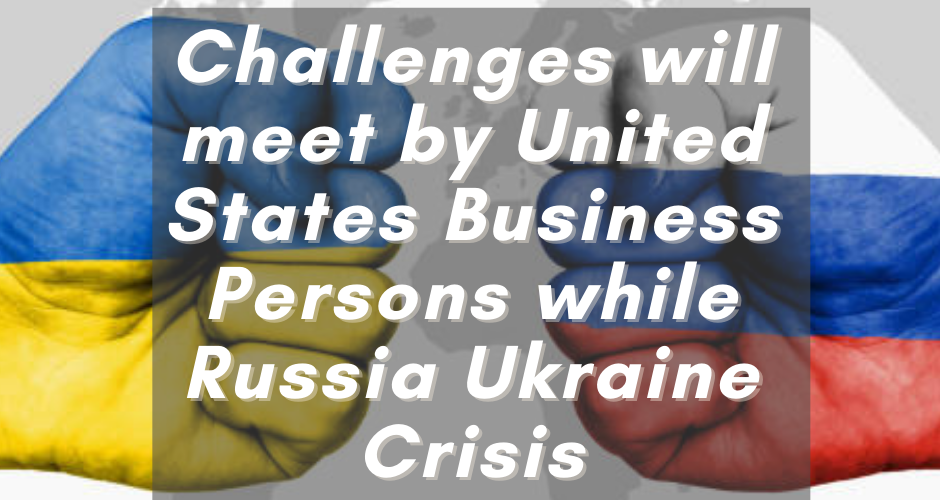The Russia and Ukraine crisis had a great impact on the global economy. When Vladimir Putin started his assault on Ukraine three weeks ago, many experts underestimated the risks for the US economy, which had entered 2022 with strong speed.
However, there has been a rethinking since then. Late last week, Goldman Sachs’ economics team forecast that the United States’ GDP will rise by only 1.75 percent from the fourth quarter of last year to the fourth quarter of this year, a dramatic decrease from the 5.7 percent growth expected in 2021.
The Goldman team also forecast a considerable chance—between 20% and 35%—of the economy entering a recession, which is typically defined as two consecutive quarters of negative GDP growth, sometime in the following twelve months.
Increase in gas and food prices
Russia’s invasion of Ukraine might have global and domestic economic consequences, increasing uncertainty, disrupting commodities markets, and even driving up inflation as global gas and food prices increase.
Since the invasion began, global oil prices have climbed sharply to above $110 per barrel. Even though the Russian invasion has not impacted global supply much, there is a strong risk that they will.
Oil merchants charge a premium to compensate for this risk, which is why we’re seeing higher prices. If supplies are severely affected, oil prices might soar to above $140 per barrel, with gas prices rising to over $5 per gallon.
Worryingly, oil and gasoline prices have a disproportionate influence in setting global investors’, firms’, and consumers’ inflation forecasts. Most of us buy gas daily and notice the price every day as we drive to and from work. Nothing impacts people’s thinking about future inflation more than what they spend at the pump now.
If inflation expectations begin to grow, the Federal Reserve will likely feel pressured to hike interest rates more aggressively. The Fed understands that if inflation expectations rise, it may spark a wage-price spiral. That is, employees will demand that their employers pay them more to compensate for the predicted increase in their cost of living, and companies will agree to do so since they will benefit.
Supply and trade chains
Because Russia and Ukraine account for less than 1% of US imports and exports, the conflict will have little impact on the economy’s commerce. Unlike its European counterparts, the United States is also a natural gas exporter, which should reduce the impact on pricing.
Furthermore, with American residents already experiencing significant rises in the cost of living including everything from autos to food as supply chains remain clogged by the COVID-19 outbreak, the invasion and any further escalation in the conflict may help maintain inflation pressures high.
In addition, Russia and Ukraine sell more than a fifth of the world’s wheat, and Ukraine is a significant maize exporter. Although the knock-on effect of rising agricultural commodity costs on consumer prices is often limited, economists at Capital Economics estimate that it might add between 0.2 and 0.4 percentage points to headline inflation in developed nations in the coming months.
Additional Challenges
Some analysts sounded the alarm. Carl Weinberg of High-Frequency Economics predicted that Vladimir Putin’s intervention in Ukraine will put the economy of Europe, and potentially the United States, on “war footing,” resulting in product shortages and increased pricing pressure. He also cautioned that, among other things, Russia may try to offset sanctions by launching cyber assaults on US or European financial systems.
Another Northern Trust economist, Carl Tannenbaum, argued that “a bigger conflict in Eastern Europe might cause a comprehensive reevaluation of the outlook” for monetary policy, increasing uncertainty and lowering morale. “Risks are skewed to the upside for the time being,” he said, adding that “central banks will tighten policy in response.”
Conclusion
A conflict does not have a winner. In armed conflicts, the destruction of life, livelihood, and property is unavoidable, and the economic consequences will last for a long time, leaving people impoverished and homeless. Covid19’s vengeance is still being felt.
World leaders should gather not to debate the severity of penalties, but to devise solutions to the problem and put a stop to the chaos. Diplomatic channels should be utilized to engage in discourse, negotiate, persuade, and reach agreeable solutions to conflict resolution. The growing flurry of sanctions on one country hurts other dependent countries and upsets the world order. Long-term violent conflicts will exacerbate the predicament of innocent countries and people
Tagged in:
12 unique business ideas, american business news, best business blogs 2022, best business blogs in america, Best business to start with little money, Blog topics for IT companies, Blogs on business strategy, business, Business Administration blogs, business blog, Business blog examples, Business blog topics 2021, Business bloggers, Business blogs examples, Business blogs to read, Business development strategy for startups, Business management blogs, current business related news, entrepreneur, Five entrepreneurial strategies, Future business ideas 2020, latest business blog ideas, latest business blog ideas america, latest usa business blogs, List of business blogs, low investment business articles, low investment business articles usa, low-cost business ideas with high profit 2021, Management blog topics, Marketing blog topics 2021, Mashable business blog, Most successful small business ideas, Small business blog, Small business blogs 2021, Small business ideas list, Startup blog topics, startup business strategy usa, Startup strategy examples, startup strategy framework, Startup strategy PDF, startup strategy plan, Startup strategy template, Survival strategies for startup business essay, Top business blogs 2021, Unique blog ideas



